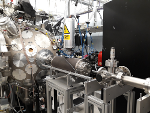| Version 28 (modified by , 6 years ago) ( diff ) |
|---|
Preparation of pre-CDR for LhARA
Last updated: 11Dec19 [KL]
An effort to develop a 'pre-CDR' has been initiated supported by the award of an STFC Opportunities 2019 award. This page is being used to collect and share information in the preparation of the pre-CDR.
Key dates
- 29 Nov 2019: First issue of the baseline. This will include lists from the various systems of what needs to be updated on the existing floor layout, WBS, interfaces document and the parameter table.
- 31 Dec 2019: First end-to-end simulation.
- 31 Jan 2020:
- Design of the facility will be frozen.
- First view of the costs.
- R&D programme needed to realise LhARA and be able to write a technical design report will be defined.
- 28 Feb 2020: Complete the write-up of the pre-CDR.
- Mar 2020: External review of pre-CDR in advance of publication.
Steering Group
- Meetings
- 28 Nov 2019 10:00 GMT
- 17 Dec 2019 10:00 GMT
- 31 Jan 2020 10:00 GMT
- 28 Feb 2020 10:00 GMT
Project management information
Work package managers
The following table lists the work packages, managers and contact details. NB: you need to be logged in to see the full email link.
Work package Manager(s) Laser driven proton and ion source Zulfikhar Najmudin
Oliver Ettlingerz.najmudin@…
o.ettlinger13@…Proton and ion capture Juergen Pozimski
Colin Whytej.pozimski@…
colin.whyte@…Stage 1 beam transport: Beam transport and delivery to the in vitro end station Jaroslaw Pasternak
William Shieldsj.pasternak@…
William.Shields.2010@…Stage 2 beam transport: Post-acceleration and beam delivery to the in vivo end station Jaroslaw Pasternak
William Shieldsj.pasternak@…
William.Shields.2010@…Biological end stations Jason Parsons
Jonathan HughesJ.Parsons@…
Jonathan.Hughes@…Infrastructure and Integration John Thomason
Galen Aymarjohn.thomason@…
galen.aymar@…Project plan for the delivery of LhARA Ajit Kurup a.kurup@… Safety John Thomason
Galen Aymarjohn.thomason@…
galen.aymar@…End-to-end simulation Ajit Kurup a.kurup@… Instrumentation TBD
Floor plan
- Version 0 of the floor plan
- Updates
- Laser
- Need two separate rooms, one for the laser system itself (12x5 m) and a second for the target chamber (5x5 m).
- These need to be separated by an interlocked shutter.
- Fit the 12x5 m room within the foot print of the version 0 floor plan, if possible.
- Capture
- Check version 0 of the floor plan includes sufficient space for power supplies.
- Beam transport details to be updated/added:
- Physical radius of FFA.
- Transfer line to the FFA injection system.
- Abort line at 15MeV (most likely to be just after the Stage 1 vertical arc for fail-safe operation).
- Stage 2 extraction line and transfer line to the in vivo end station.
- Stage 2 vertical bend to the second in vitro end station.
- Abort line at 127 MeV.
- Location of rebunching cavities.
- Location of collimators.
- Power supplies for magnets.
- Power supplies (and klystrons?) for RF cavities.
- End station
- First draft of in vitro end station floor plan.
- Can be re-configured to allow two end stations in Stage 2.
- Current space for in vivo end station is sufficient.
- The space needed for animal holding will not be included in the pre-CDR (the need for this will be mentioned in the pre-CDR).
- Radiation shielding
- Around laser target vessel.
- Around collimators.
- Around beam dumps?
- Infrastructure
- Access to basement for installation, etc.
- Instrumentation
- Beam diagnostics.
- Laser
R&D Plan
- Laser
- No major R&D needed for the laser since it will be a commercial system.
- Target particle production.
- Proton and ion capture.
- Gabor lens prototype development and performance verification.
- Stage 1 beam transport.
- No major R&D needed.
- Stage 2 beam transport.
- FFA: Magnet design and prototyping.
- FFA: RF cavity performance verification.
- End station
- Automation.
- Instrumentation.
- Dose calibration for high-intensity beams.
- Online dose monitor.
- Online beam monitor for low energy beam.
Instrumentation
A number of systems will require diagnostic devices and these will be coordinated by the instrumentation work package. Currently it is envisaged that there will be the need for devices that will characterize the beam intensity and energy; dose monitoring, in particular online 2-D dose profile monitors; and dose calibration for very high intensity beams. The two existing detector development projects (the SmartPhantom and the SciWire) can act as a starting point for developing these.
Attachments (18)
-
2019-11-05-WBS.pdf
(125.9 KB
) - added by 6 years ago.
Work breakdown structure
-
2019-11-05-Interfaces.pdf
(275.5 KB
) - added by 6 years ago.
Definition of the system interfaces
- 2019-11-15-Interfaces.pdf (276.1 KB ) - added by 6 years ago.
- FloorPlan-v0.png (221.9 KB ) - added by 6 years ago.
- In vitro end station floor plan draft.docx (168.9 KB ) - added by 6 years ago.
- LhARA_parameter_list-v3.pdf (68.7 KB ) - added by 6 years ago.
- In vitro end station floor plan v2.docx (238.7 KB ) - added by 6 years ago.
- Gabor_Laser_cartoon_20_01_15.pdf (413.2 KB ) - added by 6 years ago.
- Pressure drop2 20_01_09.docx (728.4 KB ) - added by 6 years ago.
- LhARA-ProjectPlan-v1.xml (8.6 MB ) - added by 6 years ago.
- LhARA-ProjectPlan-v1.pdf (381.3 KB ) - added by 6 years ago.
- LhARA-ProjectPlan-v2.pdf (385.7 KB ) - added by 6 years ago.
- LhARA-ProjectPlan-v2.xml (11.5 MB ) - added by 6 years ago.
- 2020-04-01-NominalBeamStage2.pdf (131.9 KB ) - added by 6 years ago.
- 2020-04-02-LhARA-preCDR-frontiers-d0.0.pdf (133.7 KB ) - added by 6 years ago.
- 2020-04-17-LhARA_pre_CDR-d3.0.pdf (10.6 MB ) - added by 6 years ago.
- 2020-05-21-Frontiers_LhARA_preCDR-d3.1.pdf (2.2 MB ) - added by 6 years ago.
- 2020-08-14-Frontiers_LhARA_preCDR-d4.0.pdf (1.9 MB ) - added by 6 years ago.
Download all attachments as: .zip
